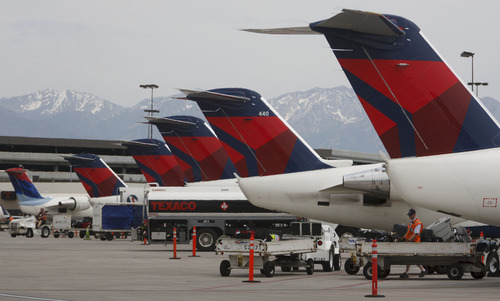This is an archived article that was published on sltrib.com in 2012, and information in the article may be outdated. It is provided only for personal research purposes and may not be reprinted.
Delta Air Lines said Wednesday that its third-quarter profit nearly doubled, mostly because of the increasing value of its fuel contracts.
But the world's second-largest airline, whose westernmost hub is at Salt Lake City International Airport, also said it would pare costs by $1 billion and trim fourth-quarter capacity as much as 3 percent after other expenses increased.
The deepest pullback will be on international routes, Delta said during a conference call with analysts and investors. Delta joins Southwest Airlines in efforts to reduce expenses after the latter said last week it plans spending cuts of at least $100 million to blunt costs that are outpacing sales gains.
Delta's routes to and from Salt Lake City will remain unchanged, except for normal seasonal adjustments, spokesman Russell Cason said. Internationally, the airline continues to fly to Paris five days a week, but the Tokyo route was discontinued last year.
The biggest piece of the savings plan comes from getting rid of aging aircraft on U.S. routes and replacing 50-seat jets with larger models. Trading out the small planes for used Boeing Co. 717s purchased from Southwest and for new Boeing 737-900ERs will reduce operating costs and put higher-fare business-class seats on more of Delta's fleet.
Delta is also in discussions with Bombardier Inc. and Embraer SA to buy about 70 76-set regional jets, and plans to make a decision on an order by year's end.
In the third quarter, Delta earned $1.05 billion, or $1.23 per share, compared with $549 million, or 65 cents, a year earlier. Excluding one-time items, it earned $768 million or 90 cents — just shy of Wall Street expectations of 91 cents.
Delta said the one-time items included a $440 million gain on fuel hedge accounting and charges for trimming jobs, trading airport slots and shutting the Comair regional unit.
Revenue rose 1 percent, to $9.92 billion, also just under analysts' estimate of $9.93 billion, according to FactSet. The airline says revenue was driven by its effort to trim seats according to demand. As it scaled back capacity, flights were slightly fuller.
Delta made 3 percent more per passenger in the third quarter, which includes a bulk of the peak summer season but also incorporates one of the weakest months — September. Traffic at all the big airlines fell last month.
Fuel costs dropped 23 percent in the third-quarter.
Excluding fuel, the cost to fly each seat a mile rose 5.6 percent last quarter for Delta's consolidated operations, which consist of its main jet flights and its regional business. Salary and wage expenses, Delta's second-largest after fuel, climbed 8 percent, and maintenance jumped 15 percent. Delta charged more for tickets to mute the impact from a 1 percent decrease in miles flown by paying passengers across its network.
Delta has been getting rid of most of its 50-seat regional jets and replacing them with larger planes that include a business-class section that commands higher fares.
The airline's fleet consisted of 775 planes, with an average age of 15.6 years, at the end of 2011, according to a regulatory filing. That compared with an average of 11 years among 12 North American carriers, according to data compiled by Bloomberg. Jets at United Continental Holdings Inc., the world's largest airline, averaged 12.4 years of age, the data show.
The other major parts of Delta's cost-reduction plan call for paring maintenance expenses and making technology improvements that will lower payments to vendors and drive more customers to Delta's reservations website to book flights because that's the cheapest way to distribute tickets.
On Wall Street, Delta shares fell 1.1 percent to $10.04 at Wednesday's close. The shares earlier fell as much as 3.4 percent for the biggest intraday decline since Aug. 28, according to data compiled by Bloomberg.
"There's no growth, and you need growth to offset cost inflation," said Savanthi Syth, a Raymond James & Associates Inc. analyst in St. Petersburg, Florida. She rates Delta stock as outperform. "The cost-cutting initiative is less related to demand. There's an expectation here that you're not going to see rapid growth anywhere."
The Salt Lake Tribune contributed to this story —
US Airways posts record 3Q profit
US Airways made its best profit ever for the three-month stretch that covers much of the peak summer vacation season. Third-quarter net income totaled $245 million, or $1.24 per share, compared with $76 million, or 41 cents per share, a year earlier. Revenue rose 3 percent but fell short of analysts' expectations.



